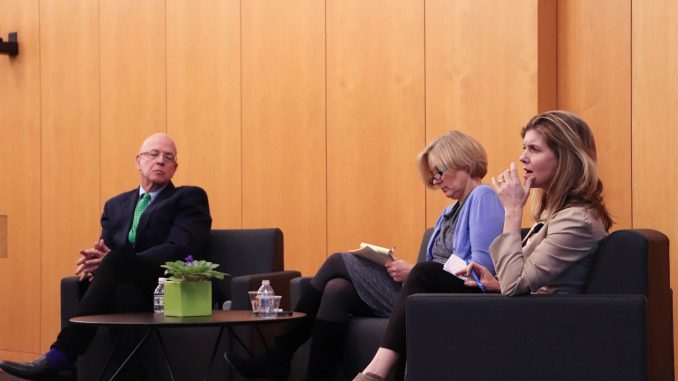
On Tuesday, speakers Margaret deGuzman and Amos Guiora discussed the current state of human rights globally in a lecture at Temple University’s Alter Hall.
“Human Rights in a Polarized World: Achieving Justice,” sponsored by Temple’s Office of International Affairs and the Global Studies program, was moderated by Petra Goedde, a Temple professor of history and director of the university’s Center for the Humanities.
deGuzman is a Temple law professor and co-director of the Institute for International Law and Public Policy, and Guiora is a professor of law at the University of Utah and author of “The Crime of Complicity: The Bystander in the Holocaust.”
The discussion focused on human rights abuses around the world and the role individuals and states should play in holding aggressors accountable.
deGuzman has been a proponent of using criminal law to tackle such abuses for years, an approach she explores in her upcoming book “Shocking The Conscience Of Humanity: Gravity And The Legitimacy Of International Criminal Law,” she said.
However, she suggested that in the current polarized climate, the use of criminal law “presents risks that it will be ineffective, risks that it will crowd out other approaches, and risks of violating defendants’ rights,” deGuzman said.
During the lecture, deGuzman criticized the U.S government’s departure from a human rights agenda towards what she called an “isolationist foreign policy,” as she alluded to its support for detention centers.
“There has been a contraction of the idea of an international community and instruments to enforce norms in this community compared to the 1990s and 2000s,” deGuzman said.
Meanwhile, Guiora, an only child of two Holocaust survivors, stressed the role bystanders play in facilitating acts of violence.
“Hitler, everyone’s written about him,” Guiora said. “The question is the bystander. You see Jews being pushed onto the train. But, it’s the bystander yelling ‘Go team, Go!’ To make a system where the bystander sees something and doesn’t do anything is a crime, is a crime, is a crime.”
Guiora’s mother, then 12, was outed twice by neighbors when hiding from the Nazis, he said. His father, 19, survived two death marches.
“The only thing offered to my father was taunting,” Guiora said.
While writing his book, Guiora said his family began to tell more of their story, and he and his father took a trip into Eastern Europe by train.
“To be on a train, through Eastern Europe, with a Holocaust survivor is a serious experience,” Guiora said. “That’s when I understood the trip. We arrived and he said ‘it’s from this platform that my parents were forced onto a train and shot later that day at Auschwitz.’”
The American government has partaken in human rights violations for a long time, dating back to the Bush administration’s use of torture at Guantanamo Bay, which continues to operate, both Guiora and De Guzman said. The next U.S. administration should prioritize human rights in foreign policy, they stressed.
The two disagreed on whether invasions should take place for declared humanitarian purposes and whether states have a responsibility to protect groups in other countries from human rights abuses. Guiora was more skeptical of the idea, while deGuzman said there is room for conflicts not approved by the U.N. Security Council if they are pursued “very carefully.”
In a press conference following the talk, deGuzman said that there wasn’t much space for the Responsibility to Protect doctrine, which has been criticized by some as a guise to justify the invasion of Libya in 2011.
“I think it really depends on if we get back on the track of putting intervention back on the table. I don’t think it’s dead, it’s dormant,” deGuzman said.
Asked whether they thought invoking the Holocaust in disussions of other human rights abuses was a useful teachable moment, or if such allusions trivialised the genocide, Guiora said that “to say that today is the same as then I resist full stop,” but stressed the importance of education around genocide.
“There are similarities. Knowing what those are and recognizing them is an important aspect of prevention,” De Guzman said in response to the same question.
Correction: A previous version of this article misrepresented deGuzman’s stance on the use of criminal law to address human rights abuses.


Be the first to comment